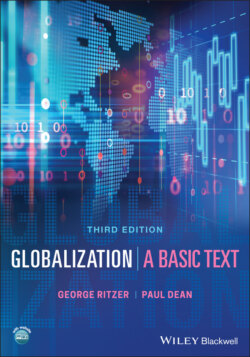Читать книгу Globalization - George Ritzer - Страница 51
IF THERE IS SUCH A THING AS GLOBALIZATION, IS IT INEXORABLE?
ОглавлениеAssuming there is such a thing as globalization, is its further development and expansion inevitable? The inevitability of globalization is a view that is widespread both in academic work and especially in more popular sources. It is, for example, the view of Thomas Friedman (1999, 2005, 2012) who, in The World is Flat, argues that globalization is expanding in various ways and directions. Daniel Altman (2007: x) contends that “the forces often labeled ‘globalization’ … are here to stay.” Nayan Chanda (2007: 320) argues that “[c]alls to shut down globalization are pointless.”
Globalization does seem inexorable as it encompasses more and more areas of the social world. However, ideas like inexorability and inevitability are always problematic from the point of view of the social sciences. It is certainly the case that there are quite strong social trends here and a very strong likelihood that they will continue, and even accelerate, in the years to come. Yet, that is not the same as saying that such changes are inevitable. Indeed, the social sciences in general point to the view that there are never any inevitabilities and this applies in particular to such a wide-ranging and globe-straddling process as globalization.
The current counter-reactions to globalization suggests globalization is not inexorable. For example, reactions in the US, Europe, and South Africa to widespread immigration, especially unauthorized immigration from less developed nations (in South Africa’s case, Zimbabwe), is leading, or at least could lead, to less rather than more globalization, at least in terms of flows of these types of people. Thus, the counter-reactions (e.g. violence against Zimbabweans in South Africa, the vote for Brexit) against globalization constitute an important check on its seemingly inevitable expansion. As noted above, COVID-19 has also stopped or slowed a variety of global flows. To prevent new cases from spreading, states closed their borders and prevented planes from various “hot spots” from entering. For the first time, travelers from the US found themselves on a list of countries barred from entering the EU and Canada. Countries were unable to access equipment and supplies (such as personal protective equipment, PPE) because supply chains were disrupted. Political leaders started questioning the reliance on global supply chains, especially those in China, and demands for domestically produced essentials became an increasingly important security issue.
The recent counter-reactions to globalization and COVID-19 have indeed led to processes of de-globalization (Link 2018). The reversal of these global flows have led many pundits and policy elites to argue that globalization, as a whole, is suffering a significant setback. For example, French President Emmanuel Macron said at the 2018 World Economic Forum: “Let us not be naive, globalization is going through a major crisis.” The Forum’s 2018 report further warned about “the death of trade.” The global slowdown from COVID-19 has led many to predict the “end of globalization.”
As noted in the sections above, the world has been through cycles or phases of globalization and de-globalization before. Arguably, the most intense de-globalizing phase came in 1914 when “the first great era of world integration in trade, cross-border investment, and migration came to an end” (Link 2018: 343). Is it possible that we are witnessing the next great phase of de-globalization?
By examining the past major phase of de-globalization and comparing it to trends today, Stefan Link (2018) argues that we are indeed witnessing a major backlash to globalization. However, he believes that we are not likely to see the depth of de-globalization that the world experienced in the first half of the twentieth century. Despite increasing political fragmentation and the return of economic barriers, Link argues that it was the Great Depression that exacerbated de-globalizing forces in the previous phase. Current economic signs do not suggest that we will see an economic collapse of that scale in the coming years, but he does not rule out the possibility. However, Link was writing before COVID-19 dramatically slowed the global economy. Nonetheless, there is not (or at least not yet) evidence of an economic collapse on the magnitude of the Great Depression.
We agree that calls for an end to globalization are overblown, returning again to the multi-dimensionality of globalization. Beyond political and economic globalization, we pay special attention here to other forms, such as cultural or technological globalization. Trade deals and nationalist politicians cannot so easily stop the flows of popular culture, such hip-hop, K-pop, or Hollywood movies. And while the infrastructure for the world wide web is also being fragmented, social media technologies, the rapid rise of cellular phones, and back channels to the Internet (e.g. through virtual private networks [VPNs]) will continue to connect people around the world. This multi-dimensionality reminds us to take a nuanced approach to understanding these global flows and structures, and their trends over time.
